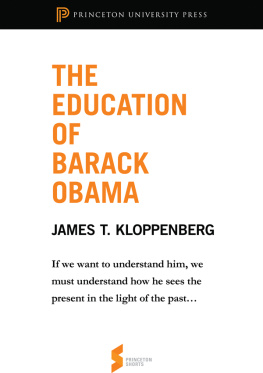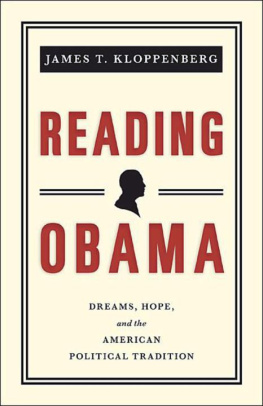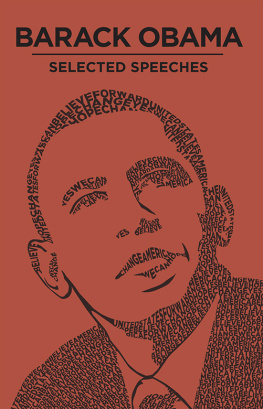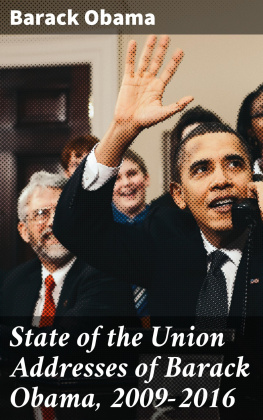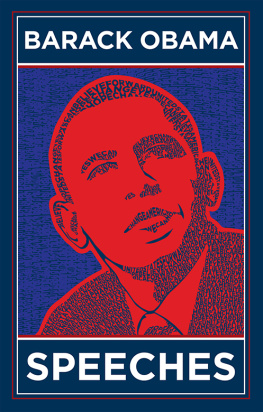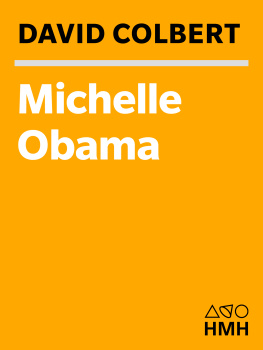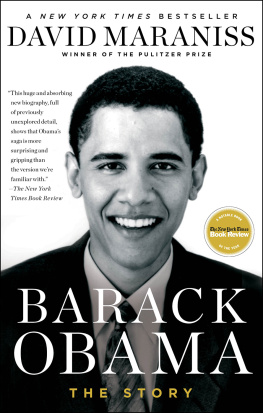The Education of Barack Obama
JAMES T. KLOPPENBERG
A PRINCETON SHORTS selection from Reading Obama: Dreams, Hope, and the American Political Tradition
If you really want to know what makes Barack Obama tick, you need to understand his education. James T. Kloppenberg explains the rich American intellectual tradition that shapes Obamas beliefs and influences his actionsparticularly his aversion to absolutes and his commitment to compromise. This look at Obamas education is a deeply rewarding education in itself.
PRINCETON SHORTS are brief selections taken from influential Princeton University Press books and produced exclusively in eBook format. Providing unmatched insight into important contemporary issues or timeless passages from classic works of the past, Princeton Shorts enable you to be an instant expert in a world where information is everywhere but quality is at a premium. For more information and a complete list of books in the series, please visit http://press.princeton.edu/PrincetonShorts.
The Education of Barack Obama comprises chapter 1 from Reading Obama: Dreams, Hope, and the American Political Tradition, by James T. Kloppenberg. Copyright 2011 by Princeton University Press
Published by Princeton University Press, 41 William Street, Princeton, New Jersey 08540
In the United Kingdom: Princeton University Press, 6 Oxford Street, Woodstock, Oxfordshire OX20 1TW
press.princeton.edu
All Rights Reserved
Library of Congress Cataloging-in-Publication Data
Kloppenberg, James T., 1951
Reading Obama : dreams, hope, and the American political tradition /
James T. Kloppenberg.1st ed.
p. cm.
Includes bibliographical references and index.
ISBN 978-0-691-14746-8 (cloth : acid-free paper)
1. Obama, BarackPhilosophy. 2. Obama, BarackKnowledge and learning. 3. Obama, BarackKnowledgeHistory. 4. United StatesPolitics and government. 5. Political cultureUnited States.
I. Title.
E908.3.K55 2011
973.932092dc22 2010020721
British Library Cataloging-in-Publication Data is available
Princeton Shorts edition, 2012
eISBN 978-1-400-84312-1
CONTENTS
On the night he was elected president of the United States, Barack Obama proclaimed that our nations greatest strength is the enduring power of our ideals. That claim not only signaled Obamas clear repudiation of the self-conscious tough-guy realism of the preceding eight years, it also suggested a dimension of the new presidents sensibility that has not received the attention it deserves. Most observers emphasized the novelty of Obamas campaign, with its reliance on grass-roots contributions and its unprecedented use of electronic communications, and not surprisingly stressed the break from the American past represented by his election and his emphasis on hope and change. Many writers linked Obama with the recurrent American impulse to begin again, the Adamic aspiration that has manifested itself in our cultures obsession with sloughing off the old and celebrating the new.
Irresistible as that reading may be given Obamas age and his race, it is a mistake. As he understands, he is a product of Americas past. Obama has demonstrated an exceptionally sophisticated and sustained engagement with the history of American thought and political culture. His approach to politics seems new only to those who lack his acquaintance with the venerable traditions of American democracy: respect for ones opponents and a willingness to compromise with them. His commitment to conciliation derives from his understanding that in a democracy all victories are incomplete. In his words, no law is ever final, no battle truly finished, because any defeat can be redeemed and any triumph lost in the next vote. Building lasting support for new policies and substantive changes is not the work of months or even years but decades.
Obamas writings show his debts to earlier American traditions and demonstrate that he has a deeper interest in, and a firmer grip on, Americas past than has any president of the United States since Theodore Roosevelt and Woodrow Wilson. The strands on which Obama has drawn, however, differ from those that have appealed to many Democrats in recent decades. In part for that reason, and even more significantly because his sensibility reflects the profound changes in American intellectual life since the 1960s, Obamas ideas and his approach to American politics have thrown political observers off balance. His books, his speeches, and his political record make clear that he represents a hybrid of old and new, which explains why he puzzles so many contemporariessupporters and critics alikewho see him through conventional and thus distorting lenses. Placing him in American intellectual history illuminates both the genuinely novel dimensions of his worldview, which have gone largely unnoticed, and the older traditions he seeks to resurrect. Obamas vision of American history and his understanding of its present condition both reflect the profound changes American culture has undergone in recent decades. If we want to understand him, we must understand how he sees the present in light of the past, and also how he envisions the future in light of his ownand his nationsplace within a global community that has undergone dramatic and unprecedented cultural transformations. As Obama put it when he accepted the Nobel Peace Prize in Oslo on December 9, 2009, the rise of transnational institutions such as the United Nations, movements such as the demand for human rights, and the process of globalization have caused people everywhere to fear the loss of what they cherish in their particular identitiestheir race, their tribe, and perhaps most powerfully their religion. Balancing those apparently irresistible dynamics against the persistent appeal of local cultural traditions, finding a way to reconcile the apparently irreconcilable tugs of the universal against the particular, is the central dynamic of the twenty-first-century world. Obama has shown that he understands the sources of that struggle and the reasons why it is so much more difficult to resolve than most commentators on the left and right admit.
A powerful wave of enthusiasm washed over the world in the wake of Obamas election, so there were not many cynics among those listening when Obama spoke in Chicago on election night. In the light of day, however, skeptics might have been tempted to dismiss his observation about the enduring power of our ideals as just another piece of charming but empty rhetoric. Which parts of the American populace shared his understanding of our ideals, including his understanding of the specific ideals he listed: democracy, liberty, opportunity, and unyielding hope? Surely the 48 percent of the electorate who voted for Republican Party candidate John McCain cherished a sense of Americas intellectual inheritance quite different from that of Obama and his supporters. Moreover, Obamas choice of words suggested those of a discredited predecessor, the last Democrat elected to the presidency. Soon after Bill Clinton used similar terms in his first inaugural address in 1993, he began wandering down a path of personal and political miscalculation that led in the opposite direction. Instead of resuscitating the weakened tradition of progressive democracy that he invoked, Clinton spent eight years triangulating, seeking a third way, and squandering the chance to draw sustenance fromand breathe new life intoAmerican democratic ideals. He left office with his party scrambling to extricate itself from his presidency and his nation even more polarized than it was when he was elected. In short, Clintons presidency suggested that hearkening back to American ideals can prove to be no more than an empty gesture. Hadnt Americans heard such talk about ideals before?


